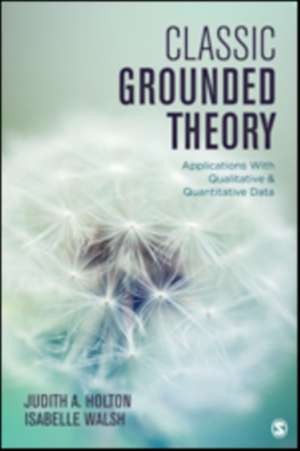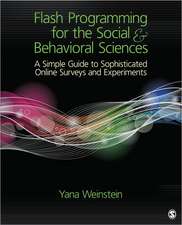Classic Grounded Theory: Applications With Qualitative and Quantitative Data
Autor Judith A. Holton, Isabelle Walshen Limba Engleză Paperback – 18 mai 2016
Preț: 405.12 lei
Preț vechi: 519.39 lei
-22% Nou
Puncte Express: 608
Preț estimativ în valută:
77.53€ • 80.64$ • 64.01£
77.53€ • 80.64$ • 64.01£
Carte disponibilă
Livrare economică 25 martie-08 aprilie
Livrare express 08-14 martie pentru 24.100 lei
Preluare comenzi: 021 569.72.76
Specificații
ISBN-13: 9781483372549
ISBN-10: 1483372545
Pagini: 256
Dimensiuni: 152 x 229 x 15 mm
Greutate: 0.32 kg
Ediția:1
Editura: SAGE Publications
Colecția Sage Publications, Inc
Locul publicării:Thousand Oaks, United States
ISBN-10: 1483372545
Pagini: 256
Dimensiuni: 152 x 229 x 15 mm
Greutate: 0.32 kg
Ediția:1
Editura: SAGE Publications
Colecția Sage Publications, Inc
Locul publicării:Thousand Oaks, United States
Recenzii
Classic Grounded Theory does a superlative job of clarifying and extending the works of Barney Glaser and the classical school of grounded theory in a way useful to both scholars and practitioners interested in applying this approach to the study of social behavior.
This is the classic grounded theory coach novice researchers have wanted. The authors anticipate the issues that stump people new to classic GT and answer frequently asked questions throughout the chapter. A clear, helpful resource.
This book is an excellent resource for researchers who want to situate their knowledge of GT within historical perspectives and tensions that contributed to the development of GT.
A nice overview and presentation about what classic grounded theory (GT) is. The book explains well the emergence of classic GT and the authors share their own experience in conducting GT. Beginners as well as advanced researchers will find some useful insights for conducting their own research. Classic Grounded Theory is a source of inspiration for encouraging the emergence of grounded theories.
This is the classic grounded theory coach novice researchers have wanted. The authors anticipate the issues that stump people new to classic GT and answer frequently asked questions throughout the chapter. A clear, helpful resource.
This book is an excellent resource for researchers who want to situate their knowledge of GT within historical perspectives and tensions that contributed to the development of GT.
A nice overview and presentation about what classic grounded theory (GT) is. The book explains well the emergence of classic GT and the authors share their own experience in conducting GT. Beginners as well as advanced researchers will find some useful insights for conducting their own research. Classic Grounded Theory is a source of inspiration for encouraging the emergence of grounded theories.
Cuprins
An Overview of Classic Grounded Theory
1. Situating Grounded Theory on the Research Landscape
The Early Development of Grounded Theory
Are Glaserian and Straussian GT Reconcilable?
The Nature and Power of Classic GT
Emergence of the Classic GT Paradigm
In Summary
Test Your Knowledge
Further Reading
2. Discovering New Theory as the End Purpose of Classic Grounded Theory
What Is a Theory?
The Drive From Substantive to Formal GT
Theorizing in Rupture With Existing Literature
In Summary
Test Your Knowledge
Further Reading
3. Foundational Pillars of Classic Grounded Theory
Emergence
Constant Comparative Analysis
Theoretical Sampling
Developing Your Stance as a Grounded Theorist
In Summary
Test Your Knowledge
Further Reading
4. Clarifying Common Sources of Confusion in Grounded Theory
Emergence Versus Preconception
Description Versus Conceptualization
Substantive Versus Theoretical Coding
In Summary
Test Your Knowledge
Further Reading
Classic Grounded Theory in Practice
5. Finding Your Data
Why "All Is Data"
Overlooked Sources of Available Data
Collecting Your Own Data
Data Collection and Analysis as an Iterative Process
In Summary
Test Your Knowledge
Further Reading
6. Analyzing Your Data
Conceptual Analysis as Distinct From Descriptive Analysis
Using Constant Comparative Analysis
Types and Stages of Coding in Grounded Theory
Core Category Emergence
The Key Role of Analytic Memoing in GT Analysis
The Iterative Nature of Data Analysis in Grounded Theory
To Software or Not to Software
In Summary
Test Your Knowledge
Further Reading
7. Shaping the Theory
Theoretical Sampling
Theoretical Saturation
Theoretical Coding
In Summary
Test Your Knowledge
Further Reading
Writing and Evaluating Classic Grounded Theory
8. Writing as an Important Part of Doing Classic GT
The Process Leading to the Readiness to Write Moment
Approaching the Literature in a GT Study
Writing GT With Mixed Quantitative and Qualitative Data
The First Draft
Writing Blocks
In Summary
Test Your Knowledge
Test Your Knowledge
Further Reading
9. Writing Classic GT for Publication
Doing Versus Writing
Writing Classic GT Using Mixed Data
Writing Conventions
Some Guidelines for Publishing Classic GT in Top Tier Research
In Summary
Test Your Knowledge
Further Reading
10. Evaluating Classic Grounded Theory
The Consequences of the Paradigm War
Criteria for Evaluating Grounded Theory
In Summary
Test Your Knowledge
Further Reading
Conclusion
Appendix A: Doing Qualitative Research Does Not Mean You Are Doing Classic GT
Appendix B: Classic GT Using Qualitative Data
Appendix C: Doing Classic GT Using Mixed Qualitative and Quantitative Data
Appendix D: Some Examples of Theoretical Coding Using Mixed Qualitative and Quantitative Data
Appendix E: Examples of Diagrams as Precursors of a Theory
1. Situating Grounded Theory on the Research Landscape
The Early Development of Grounded Theory
Are Glaserian and Straussian GT Reconcilable?
The Nature and Power of Classic GT
Emergence of the Classic GT Paradigm
In Summary
Test Your Knowledge
Further Reading
2. Discovering New Theory as the End Purpose of Classic Grounded Theory
What Is a Theory?
The Drive From Substantive to Formal GT
Theorizing in Rupture With Existing Literature
In Summary
Test Your Knowledge
Further Reading
3. Foundational Pillars of Classic Grounded Theory
Emergence
Constant Comparative Analysis
Theoretical Sampling
Developing Your Stance as a Grounded Theorist
In Summary
Test Your Knowledge
Further Reading
4. Clarifying Common Sources of Confusion in Grounded Theory
Emergence Versus Preconception
Description Versus Conceptualization
Substantive Versus Theoretical Coding
In Summary
Test Your Knowledge
Further Reading
Classic Grounded Theory in Practice
5. Finding Your Data
Why "All Is Data"
Overlooked Sources of Available Data
Collecting Your Own Data
Data Collection and Analysis as an Iterative Process
In Summary
Test Your Knowledge
Further Reading
6. Analyzing Your Data
Conceptual Analysis as Distinct From Descriptive Analysis
Using Constant Comparative Analysis
Types and Stages of Coding in Grounded Theory
Core Category Emergence
The Key Role of Analytic Memoing in GT Analysis
The Iterative Nature of Data Analysis in Grounded Theory
To Software or Not to Software
In Summary
Test Your Knowledge
Further Reading
7. Shaping the Theory
Theoretical Sampling
Theoretical Saturation
Theoretical Coding
In Summary
Test Your Knowledge
Further Reading
Writing and Evaluating Classic Grounded Theory
8. Writing as an Important Part of Doing Classic GT
The Process Leading to the Readiness to Write Moment
Approaching the Literature in a GT Study
Writing GT With Mixed Quantitative and Qualitative Data
The First Draft
Writing Blocks
In Summary
Test Your Knowledge
Test Your Knowledge
Further Reading
9. Writing Classic GT for Publication
Doing Versus Writing
Writing Classic GT Using Mixed Data
Writing Conventions
Some Guidelines for Publishing Classic GT in Top Tier Research
In Summary
Test Your Knowledge
Further Reading
10. Evaluating Classic Grounded Theory
The Consequences of the Paradigm War
Criteria for Evaluating Grounded Theory
In Summary
Test Your Knowledge
Further Reading
Conclusion
Appendix A: Doing Qualitative Research Does Not Mean You Are Doing Classic GT
Appendix B: Classic GT Using Qualitative Data
Appendix C: Doing Classic GT Using Mixed Qualitative and Quantitative Data
Appendix D: Some Examples of Theoretical Coding Using Mixed Qualitative and Quantitative Data
Appendix E: Examples of Diagrams as Precursors of a Theory
Notă biografică
Descriere
This book provides practical step-by-step guidance for doing grounded theory (GT) using the classic approach articulated by Barney Glaser.







